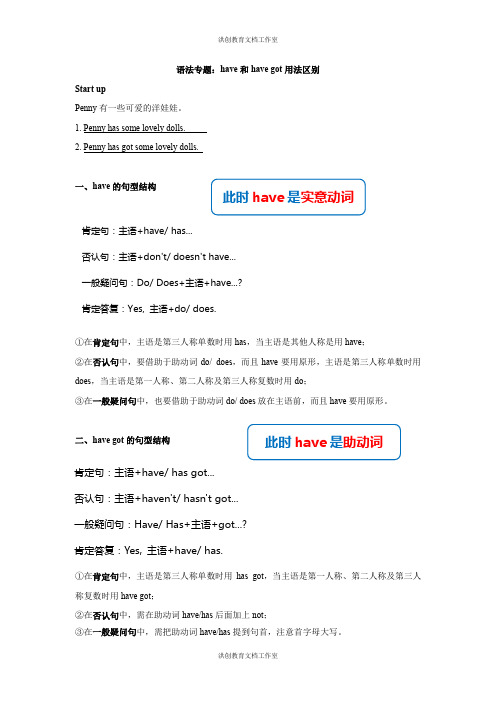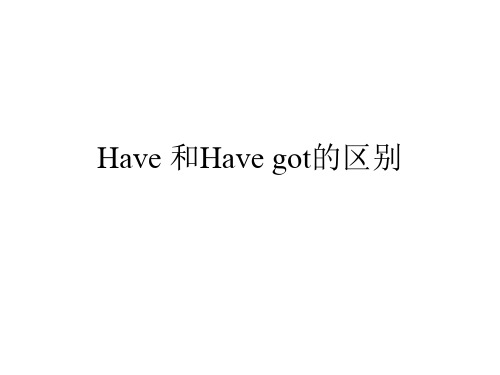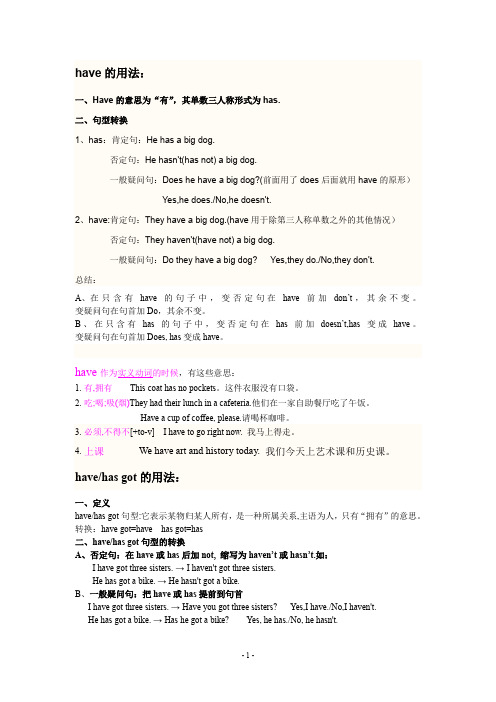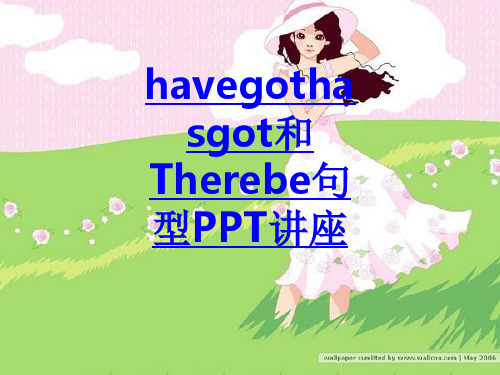have 与 have got区别备课讲稿
小升初英语语法专题精讲学案 have和have got用法区别 (难度简单)

语法专题:have 和have got 用法区别Start upPenny 有一些可爱的洋娃娃。
1. Penny has some lovely dolls.2. Penny has got some lovely dolls.一、have 的句型结构①在肯定句中,主语是第三人称单数时用has ,当主语是其他人称是用have ;②在否认句中,要借助于助动词do/ does ,而且have 要用原形,主语是第三人称单数时用does ,当主语是第一人称、第二人称及第三人称复数时用do ;③在一般疑问句中,也要借助于助动词do/ does 放在主语前,而且have 要用原形。
二、have got 的句型结构①在肯定句中,主语是第三人称单数时用has got ,当主语是第一人称、第二人称及第三人称复数时用have got ;②在否认句中,需在助动词have/has 后面加上not ;③在一般疑问句中,需把助动词have/has 提到句首,注意首字母大写。
肯定句:主语+have/ has... 否认句:主语+don't/ doesn't have...一般疑问句:Do/ Does+主语+have...?肯定答复:Yes, 主语+do/ does. 此时have 是实意动词 此时have 是助动词肯定句:主语+have/ has got... 否认句:主语+haven't/ hasn't got...一般疑问句:Have/ Has+主语+got...? 肯定答复:Yes, 主语+have/ has.练一练一、单项选择。
( ) 1. _______ he _______ a new pencil case?A. Has; getB. Does; haveC. Has; have( ) 2. They _______ some beautiful stickers.A. have gotB. has gotC. has( ) 3. Su Yang _______ any pens.A. hasB. has gotC. hasn't got( ) 4. What _______ the twins got in their bags?A. hasB. haveC. do( ) 5. David's friend _______ some nice toy planes.A. hasB. haveC. have got二、用所给单词的适当形式填空。
have-与-have-got区别

Exercise:
He rides the motorbike to his factory every day.
The motorbike is ridden to his factory every day.
• 3.will表示人的主观意愿,它带有浓厚的 感情色彩。
Come earlier tomorrow, or I won’t let you in. 明天早点儿来,否则我不让你进来。
• 4.在问对方是否愿意或表示客气的邀请或 命令时,常用will。
Will you go to see a film with us? 你愿意和我们一起去看电影吗? 5.表示不以人们的意志为转移的规律。
They make shoes in that factory.
Shoes are made by them in that factory. were
被动语态的大体构成: Be + PP(过去分词)
主动语态变被动之歌:
被动语态强调宾,be后加上过去分。 Be要随着主语变,人称时态要弄准。 行为对象作主语, 逻辑主语by来引。
• 注意:
• 1. 如果be going to后接的是形容词或副词 (there)时,其后应加上be,然后再接形容 词或副词。
I’m going to be busy this Sunday.
这个星期天我很忙
• 2. there be句型也可用于这种句型中,但 there不能和have连用。
There is going to be an English film this evening. 今天晚上有一场英文电影。
• 注意 Have / has got 没有时态的变化,只能用于 一般现在时,不能用于完成时,过去式和 将来时等时态
have_got的详细用法教学内容

h a v e_g o t的详细用法复习:have的用法及否定句、一般疑问句的变法。
①have的意思是:________,它的单数形式是:_______。
have是_______词。
例如:我有许多好朋友。
_____ _____ many good friends.他有许多好朋友。
_____ _____ many good friends.②把下列两道题改为否定句:1、I have many good friends:_____________________________总结:have 的句子改为否定句要_______________________________________________________________2、He has a dog:_________________________ 总结:has的句子改为否定句要_____________________________________同样的道理:请将下列两道题改为一般疑问句:I have many good friends:_____________________________ 总结:______________________________________He has a dog:_________________________ 总结:________________________________________________________练习:一、用have的正确形式填空:1、He_____two brothers.2、I_____a beautiful picture.3、Betty_____ a lovely dog.4、They_____some friends here.二、请将下列的句子改为否定句和一般疑问句。
1-3题改为否定句:1、He has two brothers. ___________________________________________________2、I have a beautiful picture. ___________________________________________________3、Betty has some friends here. ___________________________________________________4-6题改为一般疑问句: 4、They have a good teacher. _________________________________肯定回答:_________________5、I have some cards. __________________________________________否定回答:____________________6、Tony has a sister. __________________________________________否定回答:____________________三、请用所给词的适当形式填空。
have、have got的用法

have、have got的用法XXXEOE内部资料Have和Have Got一、Have的用法及否定句、一般疑问句的变化1、Have的意思是“有”,单数形式为“has”,have是实义词。
例如:我有许多好朋友。
I have many good friends.他有许多好朋友。
He has many good friends.2、否定句I have many good friends:I don't have many good friends。
have的句子改为否定句要加上don't/doesn't。
He has a dog:He doesn't have a dog。
has的句子改为否定句要加上don't/doesn't。
3、一般疑问句I have many good friends:Do you have many good friends。
加上Do/Does变为一般疑问句。
He has a dog:Does he have a dog。
加上Do/Does变为一般疑问句。
二)练1、用have的正确形式填空。
1)He has two brothers。
(2)I have a beautiful picture。
(3)XXX(4)They have some friends here.2、请将下列的句子改为否定句和一般疑问句。
改为否定句:1)XXX.2)I don't have a beautiful picture.3)XXX.改为一般疑问句:1)Does he have two brothers?2)Do I have a beautiful picture?3)Does Betty have some friends here?1.They have a good XXX.肯定回答:Yes。
they do.2.I have some cards.否定回答:No。
完整word版,have_havegot以及there_be的区别

have的用法:一、Have的意思为“有”,其单数三人称形式为has.二、句型转换1、has:肯定句:He has a big dog.否定句:He hasn't(has not) a big dog.一般疑问句:Does he have a big dog?(前面用了does后面就用have的原形)Yes,he does./No,he doesn't.2、have:肯定句:They have a big dog.(have用于除第三人称单数之外的其他情况)否定句:They haven't(have not) a big dog.一般疑问句:Do they have a big dog? Yes,they do./No,they don't.总结:A、在只含有have的句子中,变否定句在have前加don’t,其余不变。
变疑问句在句首加Do,其余不变。
B、在只含有has的句子中,变否定句在has前加doesn’t,has变成have。
变疑问句在句首加Does, has变成have。
have作为实义动词的时候,有这些意思:1.有,拥有This coat has no pockets。
这件衣服没有口袋。
2.吃;喝;吸(烟)They had their lunch in a cafeteria.他们在一家自助餐厅吃了午饭。
Have a cup of coffee, please.请喝杯咖啡。
3.必须,不得不[+to-v] I have to go right now. 我马上得走。
4.上课We have art and history today. 我们今天上艺术课和历史课。
have/has got的用法:一、定义have/has got句型:它表示某物归某人所有,是一种所属关系,主语为人,只有“拥有”的意思。
转换:have got=have has got=has二、have/has got句型的转换A、否定句:在have或has后加not, 缩写为h aven’t或h asn’t.如:I have got three sisters. →I haven't got three sisters.He has got a bike. → He hasn't got a bike.B、一般疑问句:把have或has提前到句首I have got three sisters. →Have you got three sisters? Yes,I have./No,I haven't.He has got a bike. →Has he got a bike? Yes, he has./No, he hasn't.there be 句型一、定义there be句型是一常见的表示“存在”的句型。
havegothasgot和Therebe句型教育课件

观察下列句子 There is a Chinatown in New York . There are lots of Chinese shops and restaurants there . There is Chinese dancing.
在某地有某物(人)
There i可数名词的复数
lots of desks/chairs/pictures
There be句型的句式变换
一般疑问句形式:把be动词提前放到句子
首位
Is there a letter for me ? Yes , there is ./ No , there isn’t .
ATrheertheearreelloottssooffssttaammppss?. Yes , there are . / No , there aren’t .
2.There are some apples on the desk .(同上)
Are there any apples
Yes , there are .
on the desk ?
3. 1.There is a big map on the wall.(变为否定句)
There isn’t a big map on the wall . 4.There are some stamps from Canada .(同上)
room. A. is B. are C. isn't D. aren't 9. There__A__some cheese on the table. A. is B. are C. has
1.There is a Great Wall in China.(变为一般疑问句 并做肯定回答)
Module4 ——专项语法
Module4—have/has got及some和any的用法【概念引入】I. have/has got的用法。
在英语中“there be句型,have/has,have/has got”都可以表示“有”。
但是用法各不相同。
本节课我们主要学习这几个“有”的区别。
Ⅱ.some和any的用法。
some和any都能用作形容词和代词,意思都是“一些”,都既可以修饰可数名词也可以修饰不可数名词;都能用作主语、宾语和表语。
例如:There are some people in the room. 房间里有一些人。
Have you got any tea? 你有茶吗?本单元我们要具体学习他们的区别和用法。
【用法讲解】1. have/has和have/has got1)在英国英语中,have/has got表示“拥有”,主语是第三人称单数时用has got,其余人称用have got。
例如:I have got a book. 我有一本书。
She has got a bike. 她有一辆自行车。
变疑问句和否定句时直接把have(has)提到句首;肯定回答用“Yes, 主语+have/has”;否定回答用“No, 主语+ haven’t/hasn’t”。
变否定句时,在have(has)后加not。
例如:—Has Tom got a new car?—Yes, he has.—No, he hasn’t.2)在美国英语中,表示“拥有”用have/has。
当主语是第三人称单数时用has,其余人称用have。
例如:We have a lot of vegetables. 我们有很多的蔬菜。
She has a piece of paper. 她有一张纸。
变疑问句或否定句都必须借助于助动词do或者does。
第三人单数用does,其余人称用do。
例如:—Does Tom have a new car?—Yes, he does.—No, he doesn’t.2. have 和there be的区别have表示“拥有”,常用来表达所属或构成关系,主语多是人;而there be结构通常表示“某处有某物(或某人)”,是表示存在意义的“有”,主语是紧跟其后的名词,而不是后面的地点。
英语have与have got的区别
*(一)、have与have got:建议查看《英语用法指南》(Practical English Usage, Michael Swan 著)第241条目have, have got表示占有,相互关系和其他状态实际上这涉及到have动词的三种用法,作助动词,作实义动词单用,以及have got。
虽然他们意思相同,但是用法存在一定差别(特别是地域性差别)一般来说,我们避免直接使用have形式(原文:“这看起来不自然”)在十分正式的英国英语里面,还可以使用Have you sth.?以及I haven't sth. ,这在美国英语是绝对不出现的。
在非正式文体中,have got更好但是have got形式不经常用在其他时态,比如I had got ,I will have got都比较少见。
但是可以与情态动词合用:She must have got a nice present.当我们表达重复性动作的时候,使用do+have的形式,而不是have got以上的用法以英国英语为标准。
如果在美国英语里面,do+have几乎是最常用的形式,口语中则会出现have got。
不过随着时间的推移,美国英语对英国英语影响越来越大,现在do+have的形式也经常被使用。
have和have got的区别尤其是在疑问句和否定句方面一、在英语口语中,常用have got 代替have ,作“有”解。
I have a bike. = I have got a bike.1.其否定式为:I don’t have a bike. = I haven’t a bike.I haven’t got a bike. (√)I don’t have got a bike. (×)2.其疑问形式为:Have you a bike? / Have you got a bike?Do you have a bike? (√)Do you have got a bike? (×)二、在下列情况下不能用have got来代替have。
七年级上册英语语法课件代词、have got句型课件(共23张PPT)
物主代 词
形代 my our your your his her its their 名代 mine ours yours yours his hers its theirs
除my,his, its外,其它人称的形容词性物主代词+ “s”就是相对应的名词性物主代词。
P r a c t i se
1. What is ______(她的)English name? 2. _____(我的)father is a doctor. 3. Where is ______(你们的)library? 4. _____(我)have a pet cat. _____(它的)name is Joy. 5. ______(我们的)classroom is big. 6. ______(他们的) books are colorful.
形容词性物主代词+名词=名词性物主代词
有名则形 无名则名
物主代 词
形容词性物主代词
名词性物主代词
人
第一人称
称
第二人称
第三人称
种
单数 复数 单数 复数
类
单数
复数
形代 my our your your his her its their 名代 mine ours yours yours his hers its theirs
When Peter went home, his father asked him what he had learned at school.
II am your father. (then pointing to his wife) She, She is your mother.You, You are my son.
人称代 词
have和 have got的区别
have和have got的区别一、在英语口语中,常用have got 代替have ,作“有”解。
I have a bike. = I have got a bike.1.其否定式为:I don’t have a bike. = I haven’t a bike.I haven’t got a bike. (√) I don’t have got a bike. (×)2.其疑问形式为:Have you a bike? / Have you got a bike?Do you have a bike? (√) Do you have got a bike? (×)二、在下列情况下不能用have got来代替have。
1. 在情态动词,助动词或动词不定式之后,只能用have,不用have got。
如:May I have some more tea? 我可以再喝点茶吗?Would you like to have another apple? 你想再吃一个苹果吗?2. 在过去时,完成时或进行时中,不用have got, 而用have。
如Li Hong had a problem.李红有一个问题。
I have had the bike for three years. 我买这辆自行车已经3年了。
3. 固定短语中不用have got。
have a rest/ a swim/ a wash/ a drink have lunch, have a meeting, have a party 仅供参考当have作"具有"“拥有”讲时通常可与have got互换。
have got通常用于一般现在时,其他时态中,一般用have,不用have got。
- 1、下载文档前请自行甄别文档内容的完整性,平台不提供额外的编辑、内容补充、找答案等附加服务。
- 2、"仅部分预览"的文档,不可在线预览部分如存在完整性等问题,可反馈申请退款(可完整预览的文档不适用该条件!)。
- 3、如文档侵犯您的权益,请联系客服反馈,我们会尽快为您处理(人工客服工作时间:9:00-18:30)。
Future
将来时态
一般将来时表示在将来某个时间 要发生的动作或存在的状态
• 一、be going to+动词原形 • 1.表示打算在最近或将来要做某事。这种
打算往往是事先考虑好的。如:
My brother is going to learn English next year. 我哥哥准备明年学英语。
Will 和be going to 区别
1. be going to 表示根据某种迹象,将来肯定 发生的事情,而 will 则没有这个意思 He is seriously ill. He is going to die.
2. be going to 含有“计划,准备”的意思,而 will 则没有这个意思 P 46 A
• Li Hong had a problem yesterday. • I have had the bike for three years.
固定短语中不能用Have/has got
Have breakfast/ lunch/dinner/supper Have a cup of tea/ coffee/ cigarette Have a bath/ a shower/ a swim/ a rest Have a party/ a holiday/ a nice time Have an accident/ an experience Have a look/ a chat/ a baby Have difficulty/ trouble/ fun
• 二、Will +动词原形 Will 可用于任何人称(口语中)
1.表示主动愿意或要求去做某事 The bag looks heavy. I’ ll help you with it.
• 2.表示预料中将要发生的动作或情况。 You’ll feel better after having this medicine. 吃了这药,你就会感到好些的。
• 注意:
• 1. 如果be going to后接的是形容词或副词 (there)时,其后应加上be,然后再接形容 词或副词。
I’m going to be busy this Sunday.
这个星期天我很忙
• 2. there be句型也可用于这种句型中,但 there不能和have连用。
There is going to be an English film this evening. 今天晚上有一场英文电影。
They make shoes in that factory.
Shoes are made by them in that factory. were
被动语态的大体构成: Be + PP(过去分词)
主动语态变被动之歌:
被动语态强调宾,be后加上过去分。 Be要随着主语变,人称时态要弄准。 行为对象作主语, 逻辑主语by来引。
have 与 have got区别
二者都是“有”“拥有”的含义
• We have got a new car. We have a new car.
She has got a stomachache. She has a stomachache.
二者的否定和疑问不同
• Have 的否定 don’t / doesn’t have I don’t have a car.
I am going to meet Tom at the station at six. 我六点钟要到火车站去接汤姆。
• 2.表示说话人根据已有的迹象认为非常可 能即将发生某事。如:
Look at these black clouds——it is going to rain. 看这些乌云——要下雨了。 I’m afraid I’m going to have a bad cold. 恐怕我要得重感冒了。
• 3.will表示人的主观意愿,它带有浓厚的 感情色彩。
Come earlier tomorrow, or I won’t let you in. 明天早点儿来,否则我不让你进来。
• 4.在问对方是否愿意或表示客气的邀请或 命令时,常用will。
Will you go to see a film with us? 你愿意和我们一起去看电影吗? 5.表示不以人们的意志为转移的规律。
• Have/ has got 的否定 主语+haven’t(hasn’t) got +其他 I haven’t got any money.
Have/ has got 的疑问 Have/ Has+主语+got +其他? Have you got any money?
• 注意 Have / has got 没有时态的变化,只能用于 一般现在时,不能用于完成时,过去式和 将来时等时态
Passive
被动语态
一:英语的谓语动词有两种语态
We speak
主语
谓语
English.
宾语
主动语态
English is s谓语
宾语
宾变主,主变宾,前加by
主变被解题步骤:
1. 找宾语 ----即动作的承受者 2. 判断宾语的单复数 ----即be动词的单复数. 3. 判断动词的时态 ----即be动词的时态. 4. 将原句动词改为过去分词 5. 修改原句的主语 ----即by+ 主语/ 宾语.
He is fourteen this year, and he will be fifteen next year. 他今年十四岁,明年十五岁。
• 二、Shall+动词原形 Shall 用于第一人称 表示建议或征求对方的意见。
Shall we go at eight? 我们八点去好吗? I shall go now.
Exercise:
He rides the motorbike to his factory every day.
The motorbike is ridden to his factory every day.
Exercise:
We call the snowman Mr. Strong.
